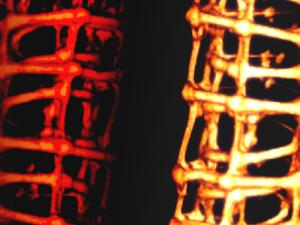Massachusetts BioResearch Product Faire™
Posted by BCI Staff on Wed, Jun 02, 2021
Tags: MIT, University of Massachusetts, Longwood Medical Center, BioResearch Product Faire™, Virtual, 2021
Posted by Jaimee Saliba on Fri, Sep 07, 2012
 It's getting to the point where there's less and less relevant distinction to be made between life science and physical science research. It was clearer when one lab had petri dishes and the other had circuitboards, but what happens when you have both? That's the case in the Harvard University labs of chemist Charles Lieber and his medical school colleague Daniel Kohane, where the bio research team has successfully created living tissue embedded with tiny nanowires capable of running an electrical current so subtle that it does not harm the tissue cells. These 3D bioelectronic structures could potentially both relay complex information about what's going on inside the tissue and receive signals from an outside source such as instructions for repairs. Several news outlets are calling it cyborg tissue and envision its future use in implants, prosthetics, or even some kind of therapeutic microbot. More immediately it will most likely be used for drug testing in labs, as a precursor to animal or human trials.
It's getting to the point where there's less and less relevant distinction to be made between life science and physical science research. It was clearer when one lab had petri dishes and the other had circuitboards, but what happens when you have both? That's the case in the Harvard University labs of chemist Charles Lieber and his medical school colleague Daniel Kohane, where the bio research team has successfully created living tissue embedded with tiny nanowires capable of running an electrical current so subtle that it does not harm the tissue cells. These 3D bioelectronic structures could potentially both relay complex information about what's going on inside the tissue and receive signals from an outside source such as instructions for repairs. Several news outlets are calling it cyborg tissue and envision its future use in implants, prosthetics, or even some kind of therapeutic microbot. More immediately it will most likely be used for drug testing in labs, as a precursor to animal or human trials.
Tags: Northeast, MIT, cell biology, 2012, Biochemistry, Massachusetts, biorobotics, Cell Research, chemistry research, bioprinting, Boston, BioResearch Product Faire Event, MA, Harvard, Harvard Medical School
Posted by BCI Staff on Tue, Nov 08, 2011
Tags: University of California Davis, MIT, cell biology, synthetic biology, Nevada, Event
The research involved in measuring infant cognitive ability over the past two decades has clearly demonstrated that babies only a few months old have a solid, basic grasp on the physicalities of the world. Now, MIT's Josh Tenenbaum has co-led a team of international researchers to explore how infants can use that knowledge to form incredibly surprising expectations of how certain new and unfamiliar situations will turn out.
Tags: Northeast, MIT, infant cognizance, Massachusetts
Posted by Jaimee Saliba on Wed, Jul 27, 2011
In the world of everyday computer technology, we know that the adjective "smart" (as in smartphone) refers to a flexible system that performs a variety of tasks on demand. My smartphone can be a camera, a calculator, a music player, a video chatting device, or an internet portal. If it were intuitive, like the car I don't yet own, it would automatically adjust its suspension for varied terrain or steer itself back onto the road if I dozed, without even requiring my input to maintain my comfort and safety.
Tags: Northeast, MIT, Massachusetts, Robotics